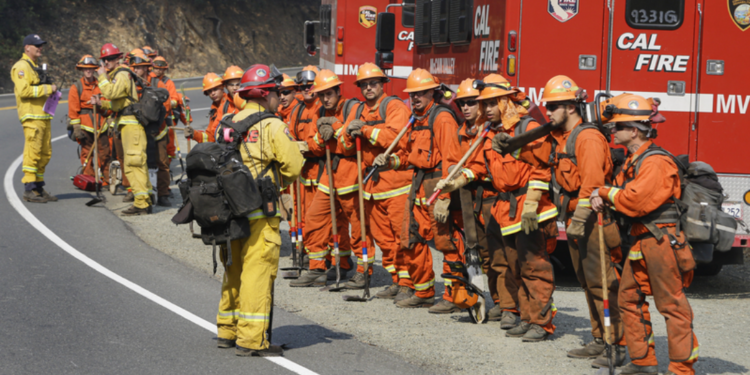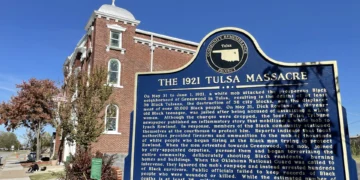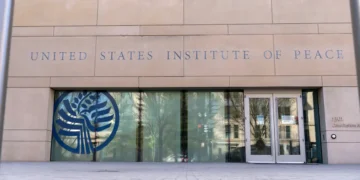Prisoners from the McCain inmate crew from San Diego prepare to clear brush from a road in Calistoga on Oct. 11, 2017. (Photo by Ben Margot, AP)
June 28, 2024 Story by: Editor
After 174 years, California voters will soon have the opportunity to abolish forced labor once and for all.
Today, the California State Senate voted to place a measure on the November ballot that would amend the state’s constitution to ban any form of forced labor. This proposal, which failed in the Legislature two years ago, was approved this time by a vote of 33-3, prompting loud cheers from supporters in the Capitol.
Authored by Assemblymember Lori Wilson, this measure is one of 14 bills prioritized by the California Legislative Black Caucus this year. The lawmakers are following recommendations from the state-funded reparations task force, which last year released a comprehensive report on the legacy of slavery and inequality dating back to the Gold Rush era when some Californians were enslaved despite the state’s free status.
Known as Assembly Constitutional Amendment 8, this anti-slavery measure primarily targets the state’s prison system.
“It is a testament to our collective resolve to correct historical wrongs and ensure that every individual in California is treated with the dignity and respect they deserve,” Wilson stated after the vote. “Now, as we look ahead to the November 2024 ballot, let us continue to work with the same spirit of determination and unity that has brought us to this moment.”
Racial justice advocates have long urged California to adopt a constitutional amendment banning involuntary servitude. Other states, including Colorado, Alabama, Vermont, and Tennessee, have passed similar measures in recent years. Nevada voters are also set to vote on a constitutional amendment banning forced labor for inmates this November.
California prisons assign about 65,000 work tasks to inmates each year, according to a 2021 official estimate. Critics argue that inmates often face retaliation when refusing dangerous assignments, which hinders their rehabilitation and future prospects.
“I have been forced to work jobs and had jobs where I couldn’t get out,” said Lawrence Cox, a policy fellow with Legal Services for Prisoners with Children, during a Senate committee hearing on June 18. As a former inmate of 17 years, he recounted how prison officials threatened to write him up if he didn’t comply. “When I wanted to take my on-site college courses to complete my degree, forced labor was prioritized over my rehabilitation.”
A Renewed Effort Against Forced Labor in Prisons
The campaign to place this measure on the ballot emphasizes that it does not oppose prison labor but insists that the dignity of work comes from the choice to engage in it. They advocate for allowing inmates to choose jobs that could help them develop valuable skills, rather than being coerced into unwanted assignments.
State prisons employ inmates for various roles, including janitorial, construction, and fire safety tasks. Incarcerated technicians earn between 30 and 48 cents per hour, while those working on wildfire containment earn $5.80 to $10.24 per day.
“Incarcerated people’s relationship to work shouldn’t be one of exploitation and little to no agency,” said Wilson, a Democrat from Suisun City. “Let us take this step to restore some dignity and humanity and prioritize rehabilitative services for the often forgotten individuals behind bars.”
The issue of indentured servitude in prisons has received increasing attention, with researchers and historians drawing parallels between the historical enslavement of African Americans and the disproportionate incarceration of Black individuals today.
Efforts to end forced labor in California prisons faltered in 2022 when a similar measure stalled in the Senate. The state Finance Department’s estimate of a $1.5 billion cost—based on the minimum wage for prison jobs—deterred support. This year, supporters modified the proposal to address these concerns, allowing prisoners to volunteer for work assignments while prohibiting forced labor.
“This came up before in our house and it did not pass,” said Sen. Bill Dodd, a Democrat from Napa, before the vote. “I just think (Assemblymember Wilson) did a wonderful job negotiating with the governor’s office and the leadership between the two houses.”
A New Strategy for the Anti-Slavery Amendment
This time, activists collaborated closely with Governor Gavin Newsom to secure agreement on the amendment’s language, said Carmen-Nicole Cox, director of government affairs with ACLU California Action. The California Democratic Party also endorsed their efforts, bolstering legislative support.
“We knew that his administration last year came in last minute with a cost analysis that killed the bill. It should not have,” said Cox, referring to the 2022 cost estimate. “The idea that we would have to pay individuals should have never been any reason for us to not end slavery because we should not be interested in exploiting human labor.”
Newsom does not need to sign the bill for it to appear on the ballot, and his office has declined to comment on it.
A spokesperson for the state corrections department stated that the prison system “values the contributions of its incarcerated workers and is committed to its mission to prepare people in its custody to successfully return to their communities.” Source: Cal Matters
















